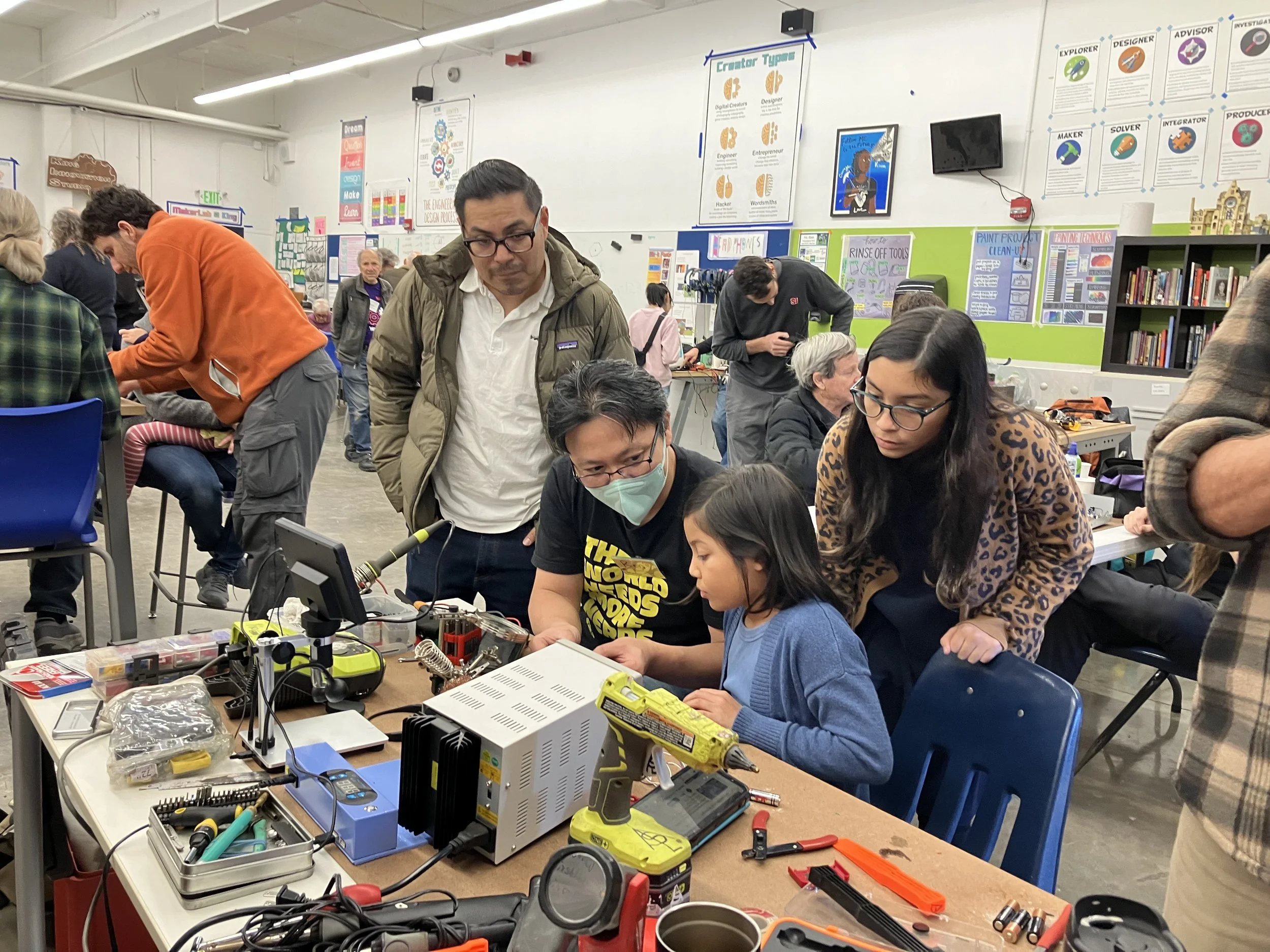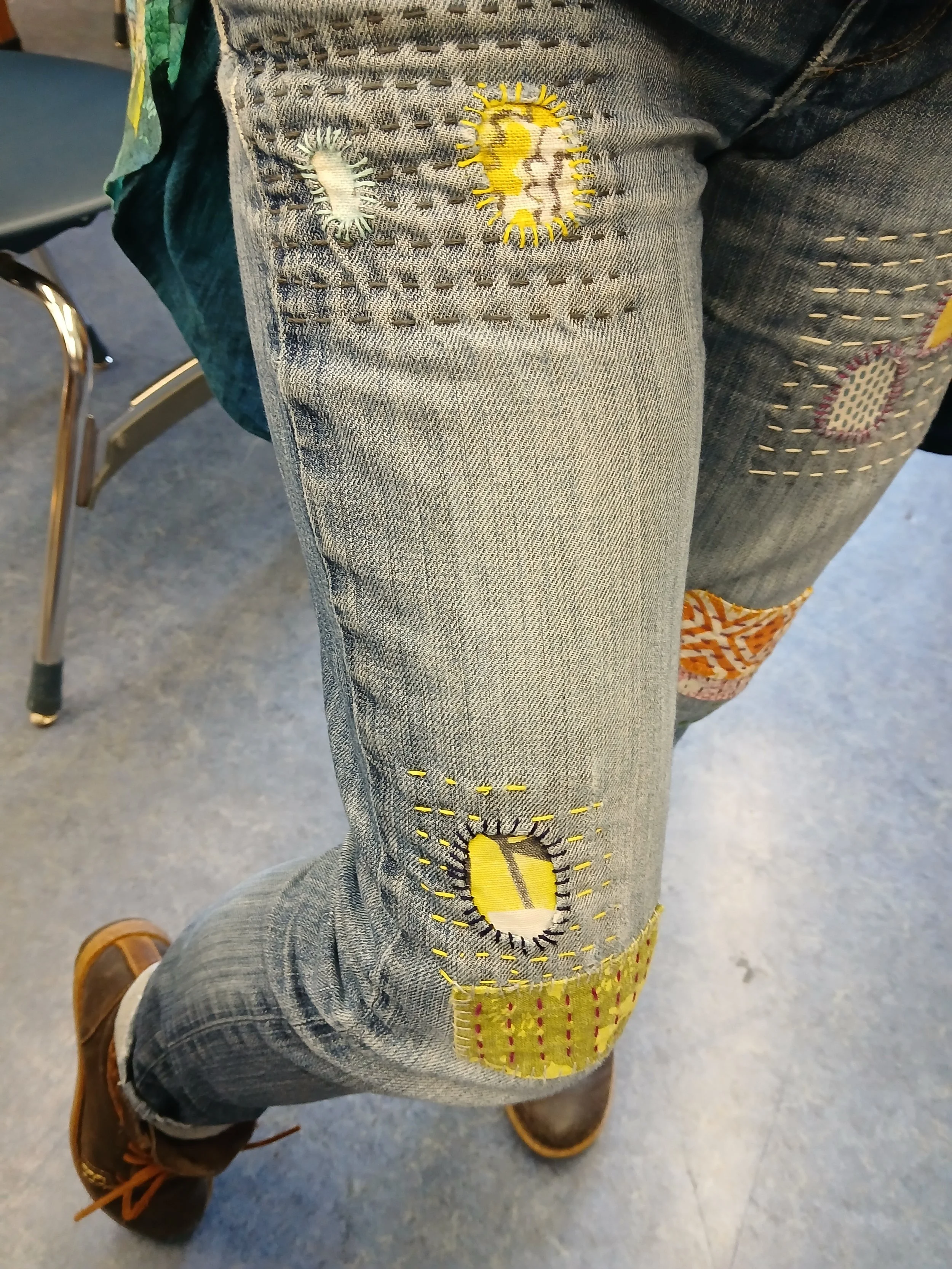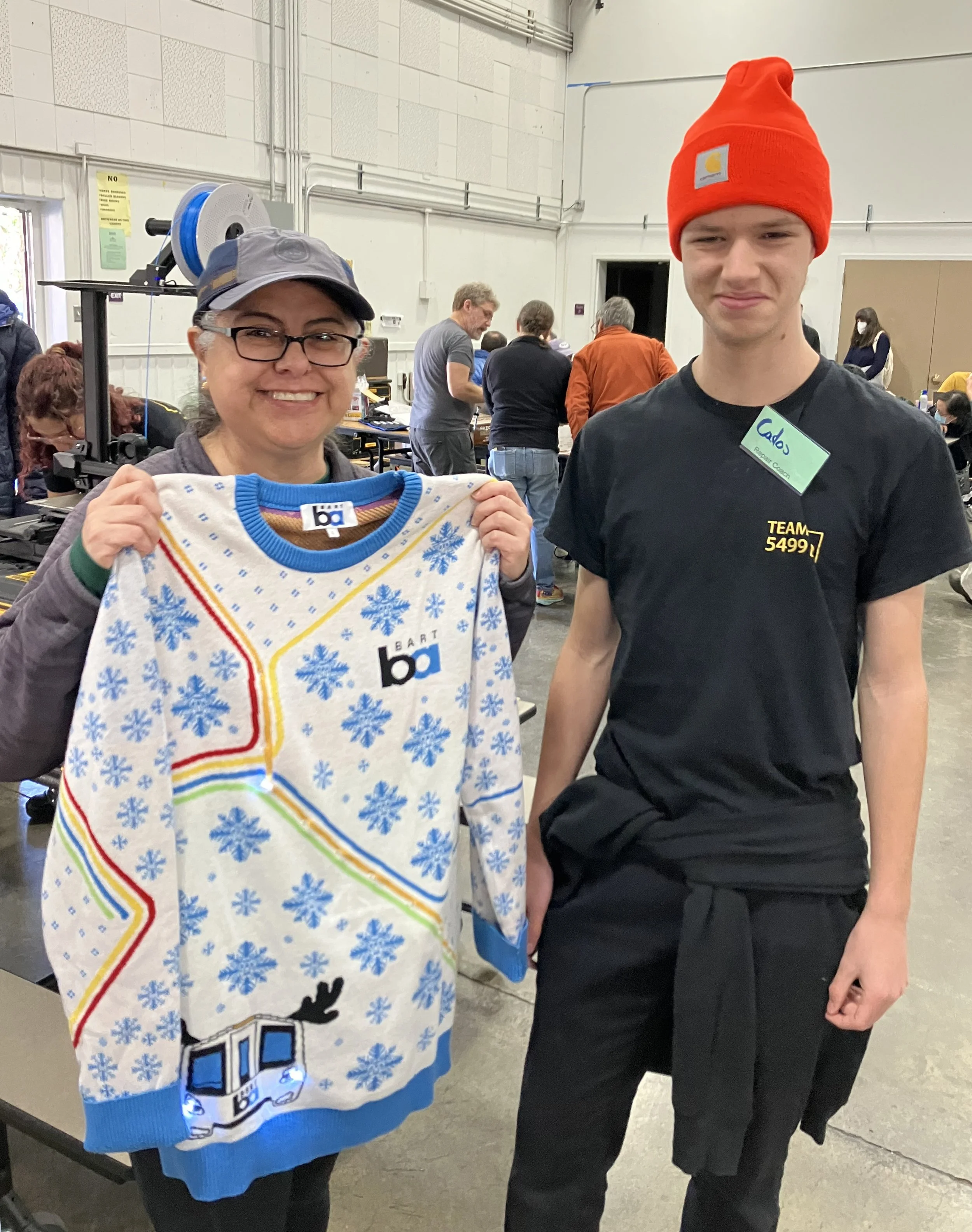June 2025
Climate Literacy Initiative Pilots Repair Curriculum and Community Events
In the 2024/25 school year, waste education was a theme for Berkeley Unified School District’s Climate Literacy Initiative. Through lessons, projects and events, we connected issues around waste to the climate crisis and focused on how we can implement simple solutions in our daily lives that add up to big positive impacts for the environment. A central project connected to our theme this year was our repair curriculum and community Fix-it Fests, a collaboration with our district’s STEM / Makerspace program.
The Climate Literacy Initiative in BUSD began in November 2021 after the passage of the school board resolution entitled an “Educational Response to the Climate Emergency.” The resolution commits to educating students about climate change and environmental justice, through interdisciplinary curriculum focusing on science, issues and solutions. At the time it was the third district in the Bay Area to make this commitment to climate education and is now joined by at least nine other school districts in the state with similar resolutions.
The first few years of the program worked towards building a culture of climate and environmental literacy in our school community. Our advisory committee established that our work should have, among other things, a focus on hands-on and action based curriculum that works towards solutions with a systems-based approach. Working groups of teachers at the elementary, middle and high school levels, meet regularly to discuss goals for climate literacy in each grade and to plan projects that focus on climate solutions and connect to core subject teaching standards.
Repair connects us to our vision of building curriculum that is hands-on, solutions oriented and encourages systems thinking. When we think about waste systems, we know that reuse and repair are more “upstream” solutions, meaning that they help stop new waste at the source. By repairing instead of buying new, we reduce the carbon emissions associated with the production of new products. Repair and reuse are tangible climate solutions that students can participate in, and also build new skills at the same time, which can help them explore career pathways. Given these connections to our program’s goals, we decided to explore ways to introduce repair into the conversation around waste education.
This school year, we piloted a week-long repair unit in STEM / Makerspace elective classes at the three middle schools in BUSD. Collaboration has remained a central focus to our climate literacy work, so it was a natural fit to partner with the Makerspace program. Given that it is an elective, there was more flexibility in the curriculum to try something new. It was a challenge to keep the curriculum to just one week, but in the end we were able to create a three-day introduction to repair that explored the benefits of repair (including environmental impact), practiced problem solving skills for repair and oriented students to commonly used tools. In the second half of the unit, students learned about sewing, bicycle and computer repair from community volunteers. Though coordinating with volunteers took more planning time, these hands-on repair lessons were highly engaging and memorable for students.
Our curriculum, lesson plans and other teaching materials are available for download from the Culture of Repair Educator Resource Library.
Wanting to expand the impact beyond the elective classes, we decided to host three Saturday community Fix-it Fests at each of the middle schools. Fix-it Fests are events where community members can bring their broken household items and learn to repair them with the support of volunteer repair coaches. We advertised to the community, with a focus on inviting students, staff and families from the school hosting the event and the nearby schools.
Students from the makerspace classes who were very engaged in the curriculum came to support the event as volunteers, and often partnered with an experienced adult repair coach, to help community members learn to repair their household items. The high school Robotics Club brought their highly-skilled students who not only worked directly with attendees, but also printed off spare parts – greatly impressing adult repair coaches. Fix-It Fests were community-minded and extremely popular – each was supported by some sixty volunteers and attended by over two hundred people from the community. Events included spaces to gather, to engage with stations designed to teach repair skills, and to enjoy food and conservation.
We’ve learned a lot along the way as we navigated our first year of this project. For starters, community partnerships were key to the success of this work! We were fortunate to work with local organizations like Transition Berkeley, Nimble Repair and The Culture of Repair Project, whose experience hosting repair events helped inform the planning for our first event. These partnerships also helped connect us to an incredible community of repair coaches, whose dedication to this work made the events possible and a huge success. The project also greatly benefited from the involvement of a retired teacher committed to climate work. Though planning for the first event was a substantial time commitment up front, each subsequent event was easier to plan and we now have a template to go on as we continue the work.
As we look towards the future, we hope to continue hosting events and maintaining repair curriculum as a part of our climate literacy program. Next year, we’re planning two community Fix-it Fests and continue to grow this offering. We plan to expand the curriculum into the advanced STEM electives, building on the introduction unit. As we grow the work we will look for more opportunities to collaborate and build partnerships, as we know that climate solutions are most effective when taken in community.
Resources mentioned in the Note above can be found in the Educator Resource Library:
Berkeley Unified School District STEM / Maker Class Repair Unit
Ellen McClure is the climate literacy teacher on special assignment at Berkeley Unified School District, California, USA. She leads the Climate Literacy Working Group for the district, working with K–12 faculty and staff to advance project-based climate change and environmental justice learning opportunities for students in the district, based on BUSD’s Climate Literacy Resolution. A founding member of the working group, she helps teachers create interdisciplinary curriculum, and develop climate-focused lesson plans tailored to their grade level and expertise. She also goes into classrooms and teaches directly.
Before taking on her role advancing climate literacy for the district, she spent over a decade as a middle school garden teacher where she developed a CTE elective class combining gardening, cooking and entrepreneurship. She holds a Career Technical Education credential in Agriculture and Natural Resources, and Health Sciences.
Ellen is a member of the CAELI District Innovation Hub. The California Environmental Literacy Initiative (CAELI) is a collective action network that seeks to ensure access to high-quality environment-based learning for all California’s TK–12 students. CAELI Innovation Hubs focus on equitably scaling environmental literacy in schools, communities, and throughout the state.
California school districts work within the context of the State Board of Education’s Environmental Principles and Concepts (EP&Cs), which are legislated and intended to inform standards-based instruction across academic disciplines. EP&Cs are a teaching resource of the California Education and the Environment Initiative, a program of CalRecycle's Office of Education and the Environment (OEE), in partnership with the California Department of Education’s California Regional Environmental Education Community Network and Ten Strands, a nonprofit organization that supports environment-based learning.





